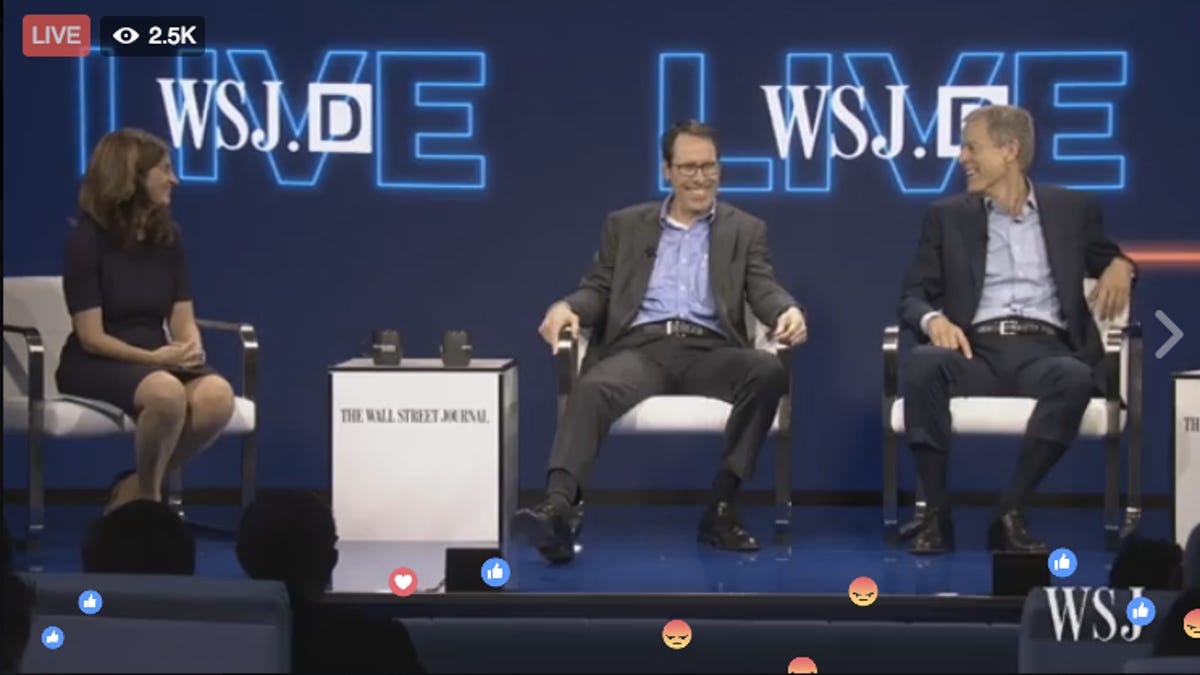AT&T prices DirecTV Now at $35 a month
With 100 channels and streaming costs included, AT&T says it's trying to upend the cable TV market with an affordable online TV service.

AT&T CEO Randall Stephenson (center) and Time Warner CEO Jeff Bewkes were on stage together at the WSJ.D conference in California to talk about their newly announced $85.4 billion merger.
AT&T wants to give you a cheaper alternative to cable TV. The answer: Its new DirecTV Now online video service will cost only $35 a month.
The price of the service, expected to launch next month, will include the cost of streaming plus 100 channels of programming, AT&T CEO Randall Stephenson said on Tuesday at the WSJ.D live conference in California.
Stephenson said DirecTV Now is just the beginning for how AT&T hopes to disrupt the cable TV market. The company announced Saturday that it plans to buy media giant Time Warner for $85.4 billion. Stephenson and Jeffrey Bewkes, Time Warner's CEO, were on stage together to discuss the newly announced deal.
As AT&T sees its traditional wireless business slow down, the company is turning to video as a way to drive new revenue. AT&T has been on a buying binge to diversify its portfolio, including the $48.5 billion purchase last year of satellite TV provider DirecTV.
Stephenson said the DirecTV Now service would not have been possible without the DirecTV deal. He sees the Time Warner deal as another important building block. Time Warner owns cable TV channels HBO and CNN as well as film studio Warner Bros., and that content will all be added to AT&T's service, if the agreement is approved by regulators.
"This deal was about one thing," Stephenson said. "How could we change the game in this ecosystem?"
He added that having scale is the only way to "drive pricing down in the marketplace" and that Time Warner content fits into that picture. But he was quick to point out that Time Warner won't be exclusively distributed by AT&T nor will the DirecTV package be limited to Time Warner content.
AT&T said previously that DirecTV Now will have content from partners including Walt Disney, Viacom and Scripps Networks Interactive.
Though AT&T is now the largest pay-TV provider in the US, with 25.3 million subscribers, it's still facing a lot of competition in the streaming-TV market. Dish Network offers 30 channels of streaming TV on its Sling TV service for $20 a month. Sony also offers a 100-plus channel package for $55 a month. Others, like streaming service Hulu, will soon enter the market with a live TV bundle of broadcast and cable TV channels.
But Stephenson said the advent of 5G wireless service that can offer downloads of 1 gigabit per second with very low latency will accelerate the mobile video trend and put the company in an enviable position. AT&T plans to begin 5G deployments in 2018.
"This is the most exciting thing I've been a part of in a long time," he said.
Politicians have already begun pushing back against the Time Warner deal, however, signaling a potentially long regulatory fight ahead. Presidential candidate Donald Trump said he'd kill the deal if elected. Sen. Al Franken (D-Minn.), a staunch opponent of big media mergers, has already sent letters to the FCC and Department of Justice asking them to scrutinize the deal.
Stephenson said those opposing the merger just don't get it yet. But he's optimistic that once the "professional" regulators see how the combined company can help drive down the cost of streaming video through more-targeted advertising, they'll agree with him.
"I think anyone who characterizes this as a means to raise prices is ignoring the basic premise of what we're trying to do here," Stephenson said. He went on to add that this merger will not change the structure of either the wireless or media markets.
"When we wake up after this deal's approved," Stephenson said, "the wireless market will look exactly the same as it does today, and the media market will look the same as it does today."

